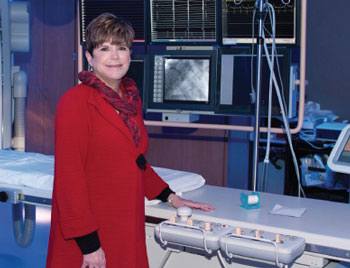By Marilyn H. Tinnin
On the day that her life turned upside down, Beth Weilenman O’Reilly was in the prime of life. The year was 2004, and she was just 48 years old. Married for 29 years to her college sweetheart who was and is still very much the love of her life, she was blessed with a career she adored, two grown sons who made a mama proud, and a daily range of activities that included, but were not limited to, church choir, Walk to Emmaus, bridge games, a tennis team, and frequent travel all over the globe.
You would be hard pressed to find anyone who had more energy or more friends than Beth. She is a people magnet. As the second of five children born to the late Bill and Bettyann Weilenman of Stoneville, her priorities have pretty much always been God and other people. But after she and her husband Guy attended an Emmaus weekend in 1989, she became more a God and other people person than ever before. Her daily prayer for herself is, “God, write your story in my life. Be seen and heard in me!”
That is certainly one prayer that God answered for Beth in spades.
On Friday, March 5, 2004, Beth headed to her classroom at Leland High School where she had taught special education Life Skills English for 23 years. That whole week, she had felt like she was getting sick, but surely she could make it one more day and have the entire next week of spring break to get well. On that fateful day, she made it to her classroom and realized there was something seriously wrong. She was having difficulty breathing at all.
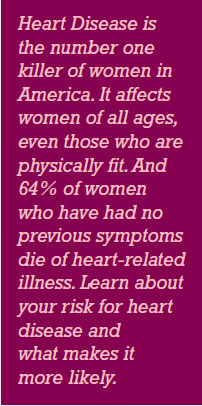 She found herself in the ICU at Delta Regional Medical Center where Dr. Michael Mansour ran a myriad of tests and delivered the rather grim news that she had cardiomyopathy and congestive heart failure, that he was hopeful medication would remedy a great deal of the discomfort, but that ultimately she might be looking at a heart transplant. A virus had evidently attacked her heart, and it was beating at 20% capacity.
She found herself in the ICU at Delta Regional Medical Center where Dr. Michael Mansour ran a myriad of tests and delivered the rather grim news that she had cardiomyopathy and congestive heart failure, that he was hopeful medication would remedy a great deal of the discomfort, but that ultimately she might be looking at a heart transplant. A virus had evidently attacked her heart, and it was beating at 20% capacity.
The lifestyle changes that were imperative and immediate included giving up tennis, giving up her career, adhering to a strict diet, and total bed rest for a while. Gradually she was able to increase her activities, but tennis and her classroom job were forever out of the question. Life, as she had lived it prior to this disruptive event, was over.
There were tears, but there was a resilient faith, too, as Beth chose to view the glass as half full rather than half empty. One of her heart’s greatest desires was to have grandchildren to love, and if altering her life made that dream a little bit more likely, she would do whatever it took. She realized she was blessed to be alive at all, and she embraced every day with a new sense of gratitude. The changes she made seemed like a small price to pay to savor the joys that lay ahead—more years with her soulmate, her sons, and, hopefully daughters-in-law and grandchildren!
The New Normal
The next seven years were good ones—great ones actually. Beth accepted that some days were going to be easier than others, but she learned to say “no” for the first time in her life. When she ran out of steam, she stopped. When she felt well, she did almost anything she wanted. Her medications were working, and other than missing tennis and her students, the new normal was okay.
She grew stronger and stronger, and even assumed the responsibility for homeschooling a severely dyslexic teenager whose educational background was riddled with defeat and sad stories of failure. On the day this young lady received her graduation certificate, Beth was the proudest “significant other” in attendance.
And as far as Beth’s health, it continued to improve. She refused to be an invalid. Beth and Guy took some interesting trips from their home in Leland via motorcycle to Martha’s Vineyard and to Niagara Falls. They also traveled to Israel, Egypt, Hawaii, Prague, and Vienna. And the greatest “normal” and wonderful events during those seven years were the births of two grandsons, Max and Parker.
Beth thought she was truly home free. She had adapted well to her curtailed lifestyle. She worked on numerous Emmaus Walks, participated in many Bible studies and attended many women’s events. Her spiritual life, which had always been notable, deepened. She did not take a single day for granted as she lived with a sense of purpose and gratitude that inspired all who knew her.
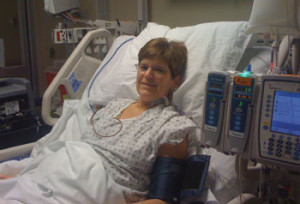
Despite the tubes and the weakness, the smile on Beth’s face never left. Her optimism did not fade, and she had a peace that impacted everyone who came into contact with her every day. It wasn’t about getting well as much as it was about her faith in the God who was holding time in His hands. Beth was never one to say, “Poor me.”
On Sunday, January 30, 2011, Guy and Beth did their usual Sunday routine which was Sunday school and the morning worship service at the Leland Methodist Church. It was after lunch that Beth began to feel weak. The afternoon began with a headache, a cough, and a flu-like aching. As the hours passed, Beth continued to feel worse and worse. By late afternoon there was no denying the fact that this was something serious. She told Guy she needed to go to the emergency room.
The initial tests and enzyme results indicated she’d had a heart attack, and she was immediately put in the Delta Regional Cardiac ICU. Word spread quickly through Leland, the Delta, and beyond. This was déjà vu panic all over again for everyone who loved Beth.
Three days of tests. Three days of doing everything within the realm of possibility at Delta Regional Medical. Beth had excellent care, but on Thursday, February 3, in the middle of frigid temperatures, sleet and freezing rain, she was taken by ambulance to University of Mississippi Medical Center in Jackson for more tests and, hopefully, a miracle.
Hope Deferred
It was at University Hospital that Beth heard the diagnosis—myocarditis, a rare condition resulting in inflammation of the heart muscle itself. This, in addition to the cardiomyopathy, added a new set of problems to her weak heart. Her heart was not able pump well enough to transport blood to all of Beth’s organs. The prognosis for recovery was poor but not impossible. The possibility of a heart transplant was now very real. As Beth’s brother Mark says, “At first, that was not an encouraging thought to any of us. We saw a heart transplant as the last resort.”
Guy, while trying to be the strong and steady encourager for his wife, was under enormous pressure in those first days at UMMC. He had a business to run back in Leland, and he quickly turned that over to their son, Rob. But his telephone rang non-stop at all hours of the day and night as friends from all over called for news of Beth’s condition and to offer prayers for both of them. Trying to answer the phone calls, give correct information—information that seemed to change with every passing hour—was taking its toll.
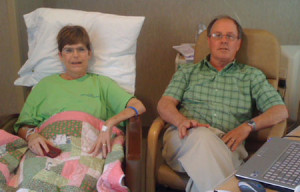
Husband Guy impressed the UMC staff as much as Beth did. He was the epitome of the perfect husband and cheerleader.
Beth’s brother, Mark, who happened to live in Jackson and worked a block or two from the hospital, offered to start a Caring Bridge site. With a background in journalism, he was a communicator, and he could handle the updates with succinct accuracy and grace. “I was as panicked as anyone, and it would give me something to do,” he says. Because Beth’s condition was so fluid, Guy was concerned that whatever was posted be correct but fairly general in detail. The future was so uncertain that they were hesitant to broadcast too much about her condition.
Guy welcomed Mark’s help. As Mark explains, “You could say I was the writer, but Guy was the editor!” Mark and Guy agreed that they wanted to approach the blog as Beth would if she had been strong enough to write it. Everyone knew of Beth’s faith, and so the spiritual dimension was front and center. Little did either know that Beth’s journey as chronicled in the Caring Bridge website would become the book Heartstrings a few years later.
Beth was in her third week at University Hospital when everything began to fail. Her kidneys, lungs and heart were growing weaker and weaker. Her heart muscle was not recovering, and her ejection fraction was extremely low. The ejection fraction measures the percentage of blood that leaves the left ventricle with each contraction. A normal ejection fraction is between 55 and 75 percent. Beth’s was five percent. She was dying.
When Mark visited his sister on that February 23, 2011, he thought he was saying goodbye. The doctors explained to the family that everything that could be done had been done.
However, Guy was not ready to give up. As he pushed Beth’s doctors for more answers, he was told that there was one last ditch effort they might possibly try. There was a machine called a CentriMag, a relatively new and slightly experimental external heart-pumping machine that might give Beth a temporary reprieve, but no one had ever used it at UMMC. It might not work at all, and because Beth was in such critical condition, such a surgery was very dangerous. But was there any other option? No.
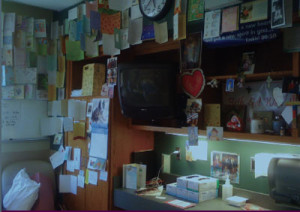
Beth’s tiny cardiac intensive care room became a virtual
studio of fan mail and well wishes over the 100 days
she was a patient at UMMC.
Guy was ready to take a chance as he told the doctors, “Let’s do it.” Ultimately, he understood a heart transplant was the only thing that was going to give Beth her life back, but they could not just wait around until a matching heart became available. This strange machine was a lifeline at that critical moment.
And to everyone’s utter delight, the CentriMag did what it was supposed to do. For the next 46 days, that machine did the work Beth’s heart could no longer do. Guy loves to compare the centrimag to a working battery for a car. Replace a dead battery with a new battery, and every gadget in the car will work—from the windshield wipers to the radio to the engine. With the CentriMag, her kidneys began to function and her lungs improved. She was placed number one on the transplant list at UMC. And the waiting began.
It seemed an odd prayer in many ways to pray for a new heart. For Beth to receive a heart and the chance at life, someone else was going to have to lose their life. Beth, Guy, their sons Rob and Will, and the rest of their extended family took that thought very seriously. Knowing how much they loved their Beth, they were not oblivious to the fact that should that matching heart become available; another family was going to face a devastating loss of someone who was likely as important to them as Beth was to her family.
How do you pray in that situation? With incredible humility and supernatural surrender to God’s sovereign will. “And the peace of God, which passeth all understanding, shall keep your hearts and minds through Christ Jesus” (Ephesians 4: 7).
The Waiting Game
It is a fact that approximately twenty-one of the 120,000 people awaiting an organ transplant die each day because a matching donor is not found in time. One organ donor can save seven lives by donating their organs, and the number increases significantly if you add eyes and tissue. As Mississippi Organ Recovery Association’s theme states, “We may be one person to the world, but to one person we may be the world.”
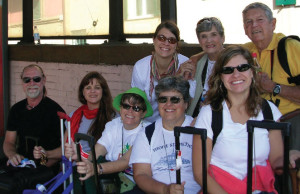
Just a few of Beth’s family cheering section. (Front row, from left) Dick Hanna, Jane Weilenman Hanna, sister; Ellen Walker, sister; Anne Stevens, niece; (Back row) Jane Warren, niece, Bill and Bettyann Weilenman, parents.
Beth continued to reside in the ICU, totally bedridden as the days passed. She could look to her right and see the CentriMag pumping at three thousand revolutions per minute. Despite the side effect of unrelenting nausea and a fever, Beth knew this amazing machine was keeping her alive, and she was grateful.
Mark and Guy continued to post entries on the Caring Bridge site, and occasionally Beth was able to tap out something. The tone of the epistle was definitely Beth, and the guestbook bulged every new day with prayers and encouraging messages from friends. Her room had been covered in a virtual wallpaper of cards, posters, and get well wishes.
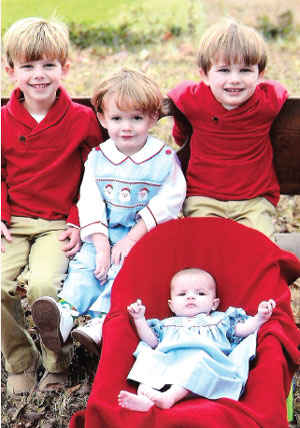
The grandchildren who were a large part of Beth’s prayer and determination to beat this challenge. (Back L to R) Max, Hall, Parker, (Front) Baby girl Ella Rives.
Occasionally, she Skyped with her grandsons Max and Parker. Just seeing those two precious boys gave her an extra boost and reminded her of the blessings she had already received. Guy came at 5 a.m. every morning, again at noon and 5 p.m. and back to say “goodnight” at 9 p.m. Before Guy left at night they would share a daily devotional and prayer time thanking God for all He had done and asking Him for continued healing. Often the staff nurses joined them. Beth had become a precious family member to everyone on the unit. But the days dragged on as they waited expectantly to hear the news of a new heart that did not come quickly.
Along with prayers for the new heart, they were praying for patience. Their ordeal gave fresh meaning to 2 Peter 3:8, “But do not overlook this one fact, beloved, that with the Lord one day is as a thousand years, and a thousand years as one day.”
March came and went. Beth could not stay on the CentriMag much longer because there were significant risks involved. If a new heart did not appear soon, the next step was another temporary device, an LVAD which was a little more portable. It is frequently used by transplant patients as they wait a more permanent solution. The downside to replacing the CentriMag with the LVAD was that Beth would automatically be removed from the top of the transplant list because she would no longer be considered in immediate peril.
Ta-dah!!!
It was Saturday morning, April 10, when Beth struck up a conversation with the lady who was cleaning her room. There was an immediate connection between the two as they began to talk about God’s blessings. Just as the lady turned to leave she said to Beth, “God just told me you will get a new heart this weekend.”
Beth was touched as she answered, “Well, that would be great,” but as long as this process had plodded along, she was not holding her breath! God’s timing was God’s timing.
The very next morning—well before the sun came up—Beth was awakened by a “committee” of doctors and nurses who gave her the long-awaited news. “Beth, you have a heart!” The joy on that floor was like “Christmas on steroids” as brother Mark, the Caring Bridge wordsmith, put it.
Beth called her husband who was immediately alert when his wife exclaimed, “Guy, I got a heart! I got a heart!” The news spread quickly through the Weilenman family, the church friends, the network of prayer warriors, and fans that had followed Beth’s journey.
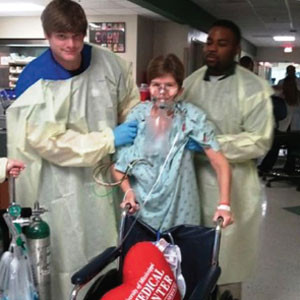
Beth had to get her “sea legs” back after months of being totally bedridden.
Walking again was a significant challenge to confront.
How fitting that this gift was delivered on the Sabbath Day! A crowd gathered in the waiting room outside the ICU. And the day dragged on. Beth later learned that when organs are donated, the last organ to be harvested is the heart. There were other patients around the country who were waiting in circumstances as dire as Beth’s who were preparing to receive kidneys, lungs, a liver, and who knows what else from this generous family who were surely grieving the sudden death of someone very precious to them.
Each transport team had to get to the hospital in that city and recover the organ they needed before the heart team could receive their precious cargo and fly back to Jackson with it.
Beth was taken to surgery for prep about 4:30 p.m. that afternoon. When her gurney headed for the elevator, it seemed that half of Leland, Mississippi was waiting—and they sent her off with a standing ovation and tears of joy.
At 1:46 a.m. on Monday morning, Beth was rolled back into her ICU room and the doctor came in to speak to the family. Although Beth would still have some rough days ahead and a grueling rehabilitation process, things had gone even better than anyone could have hoped. Never had her surgeon had a transplant patient whose ejection rate was as low as Beth’s who had come through surgery with such flying colors.
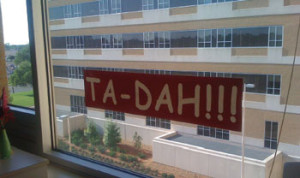
Ta-Dah became a mantra as Beth’s young grandson Parker adopted the phrase to demonstrate every new thing he learned. It was a family joke, but so apropos in a situation where humor
relieved a lot of anxiety.
A new banner that covered an entire wall of her ICU room shouted “TA-DAH!!!” Grandson Max, just two years old, had recently taken up that phrase and he shouted it as often as possible. It had become Beth’s special mantra that captured her indomitable spirit and confidence in God’s complete command of the situation throughout the lengthy ordeal.
Life Goes On
The next four weeks were a constant push toward health and restoration. There were still a million things that could go wrong, and a delicate balance to strike in the midst of retraining her long-bedridden body to do the routine everyday things that an independent healthy person takes for granted. There were constant tests, exercises, therapies, procedures to boost the immune system, to prevent rejection, to regulate the new heart, to overcome the effects of 76 days in bed. The home stretch was in view, but it was as difficult and demanding as any leg of this journey had been.
But there was not a millisecond of challenge that dampened Beth’s total euphoria and enthusiasm over the future that had been given to her. As she wrote in a Caring Bridge post, “I’ve been given this blessing and I want to make sure I honor God as I look for ways to serve, as I continue to recover.”

The weekly Leland Progress followed Beth’s journey. Beth’s close friend Amy Taylor compiled the Caring Bridge journal in Heartstrings, available in bookstores and Amazon.
Four weeks after the miraculous surgery that had given Beth a new heart, she and Guy drove down the familiar street to their home in Leland. Friends lined the avenue, and welcome home posters and balloons were staked across her yard like a political campaign in full bloom. It was a homecoming worthy of a hero, and Beth was definitely that to so many.
People often ask Beth if there are any predictors on how long she could expect to live with her new heart. As one who is playing tennis with vigor again and whose check-ups continue to get A+ results from her doctors, such a question is almost insulting. “Why, I plan to live until at least 82,” she says. Ninety-five is probably more like it.
Her doctors do say that the fact that Beth took such great care of herself in those seven years between her first heart event and the critical illness of 2011 gave her an advantage over some transplant patients. The impact of her faith on her physical wellbeing would also be hard to dispute.
As her brother Mark reminded her friends on Caring Bridge, “Beth has been making investments into her spiritual bank during the many, many years she’s been an active Christian. When she needed to dip into that reservoir of faith, there was more than enough there to get her through this, with plenty left over still earning interest.”
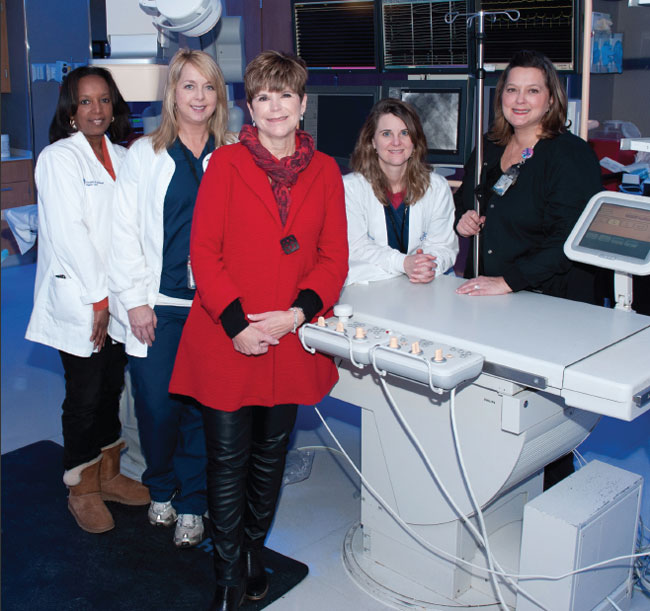
Beth and her transplant team are friends forever. (L to R) Brennett Brown, Nicole Whatley, Beth, Jenny Humphries, and Tammy Boles.
The Legacy of Giving
As you can imagine, Beth O’Reilly has become a cheerleader for the Mississippi Organ Recovery Association. She has been called on often to share her story, a request that she considers to be a high privilege. She hopes to one day meet the family of the woman whose heart gave her a second chance.
It was truly a gift of love on the part of that family, and as Beth says beautifully, “Love is the only thing it is okay to do in excess.”
Months after the surgery, Beth had the chance to write to her donor’s family. MORA delivered the letter to the anonymous family. So far, Beth has not gotten to meet them, but she hopes as time passes they will want to meet the lady who carries their precious loved one’s heart. Her words to them say it all:
Life is truly a mystery. We don’t understand why things happen the way they do. I have prayed for you and your family and the grief you are bearing. As I tell people about my experience, I honor you and your gift of life each time…know that I remember you in my prayers daily. I thank you for my heart….Beth.
And as Beth continues to speak, she reminds everyone who hears her words, “…if God’s aim is to expand the boundaries of His kingdom, then He has succeeded. For every time He heals, a thousand sermons are preached.”
And all God’s people say, “Amen!”
